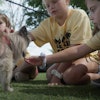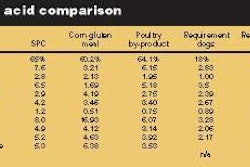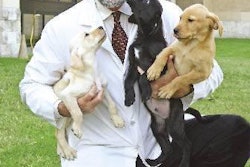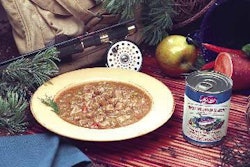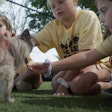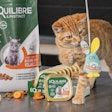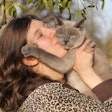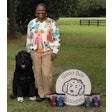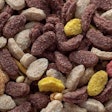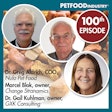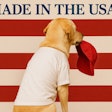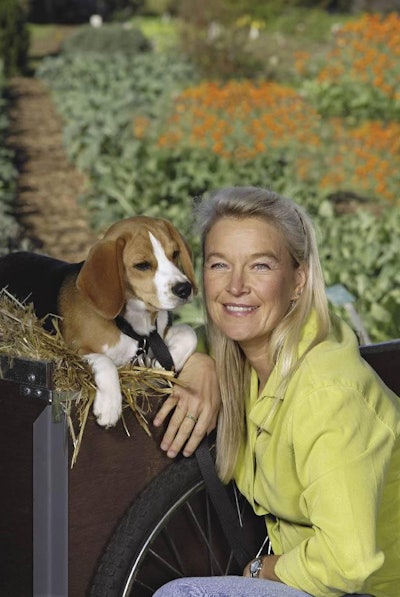
You would expect the life of a child of actors Paul Newman and Joanne Woodward to be a bit above the ordinary. And you'd be right.
"I had a lot of pets growing up. A menagerie! Ferrets, a lot of baby birds, a Harris hawk, five cats and a pack of dogs" relates Nell Newman in her book The Newman's Own Organics Guide to a Good Life.
When Newman was 10 years old she found out peregrine falcons were extinct east of the Mississippi River. That discovery proved the catalyst for her zealous concern for the environment. It also led her to earn a Bachelor of Science degree in human ecology from the College of the Atlantic and to work with raptors as a child and professionally.
Newman's experiences caused her to believe animals display conspicuous health and vitality when they are fed what they would instinctively feed on in the wildan unadulterated diet of natural foods. "A peregrine falcon is near the top of the food chain," she reasons. "In a way, so are dogs." Why not feed pets, then, the healthiest, most natural foods available?
Thus emerged Newman's Own Organics Premium Pet Foods.
Not hippie-dippy
Paul Newman had proved a hard sell when it came to adding an organic line to his popular Newman's Own brand. An all-organic Thanksgiving meal finally sold him on the idea, proving organic need not translate into "hippie-dippy dishes," in Nell's words. His organic education soon followed when he hired his daughter and her business partner, Peter Meehan, to research the market for organic food products. Newman's Own Organics was off and running in 1993. It became a separate company in 2001.
The move into organic petfood in 2003 was a logical progression. The complete line of dry and canned foods for dogs and cats, plus dog treats, are made with at least 70% organic ingredients. The products are also processed according to standards from the US Department of Agriculture National Organic Program and certified by Oregon Tilth, a third-party, nonprofit certifying agency for organic farmers.
Double-digit growth
"The whole petfood industry is growing with organic," Nell Newman says. "And the organic food industry as a whole has seen double-digit growth annually since 1990."
"Organic is a niche within a niche," notes L. Phillips Brown, DVM, research and product consultant for Newman's Own Organics' petfood division. "A lot of folks don't realize the difference between natural and organic."
Natural is one of the more dynamic segments of the petfood market, Brown points out. Sales of natural petfood products grew nealy 70% from 2001 to 2005 and are projected to continue to grow 15% annually through 2010, according to Packaged Facts. The entire petfood industry grew 23% between 2001 and 2005, with growth hovering at 4 to 5% annually.
The Organic Trade Association (OTA) reports a 17% increase in sales in the organic industry in 2005 and total organic sales of US$14.6 billion. Last year, organic petfoods tallied US$30 million in sales, a 46% increase over the previous year, according to OTA.
Though the privately owned Newman's Own Organics does not share its sales figures, Newman claims the company has posted double-digit growth since its inception and that petfood sales have kept pace, with solid growth every year.
Qualifying for certification
To qualify for organic certification, Newman's Own Organics petfoods cannot contain conventional pesticides or herbicides, synthetic fertilizers, sew-age sludge, genetically modified organisms, ionizing radiation, antibiotics or growth hormones.
Manufacturing facilities must be carefully selected and strictly inspected. (The company's petfoods are co-packed.)
Unfortunately, demand for organic products has outstripped the agricultural supply, according to Newman and Brown. That fact continues to plague the industry and ensures products will sell for premium prices for years to come, Brown says.
Good enough for Paul
Newman's Own prides itself on the wholesomeness of the ingredients in its petfood formulations. Products are made with human-grade chicken, chicken meal or fish meal and organic grains and vegetables. Other premium ingredients include flaxseed meal, brown rice, antioxidants, organic barley, milo, oats, carrots, potatoes and chelated minerals.
"Our products were human grade from the start," says Newman. "Once I found out that 'by-product' on a label could mean beaks and feet and entrails going into petfoods, I thought, We can do it better.'"
The line has benefited from face time from its namesake, who recently endorsed the premium petfood line in a rare television appearance. Prodded by host Jay Leno and a US$10 bet on the Tonight Show, Paul Newman ate from a can of the chicken and brown rice dog food before millions of late-night viewers.
Lifestyle, lifestage
Organic purchases reflect the lifestyle preferences of pet owners. Many are ardent about their choice of organic, which is often tied to their values and belief systems.
Brown believes that owners who opt for organic tend to purchase premium petfoods. Newman's Own dog foods are geared to lifestage categories: adult for dogs up to 7 years old, senior for dogs older than 7 and puppy/active. Cat foods are similarly divided into adult/kitten and senior cat categories. Dog treats are offered in four flavors for small and medium/large dogs.
"We like foods geared to lifestyle, and lifestage choices are part of that," says Brown.
Like the rest of the products bearing the Newman's Own brand in retail outlets, the petfood line has benefited from Newman philanthropy. "Initially we rode on Dad's coattails," says Newman. "But now we are riding our high-quality products."
Newman also credits owner satisfaction for the repeat sales. "We get E-mail that is quite remarkable," she says. "For example, 'We put our pet on your petfood and her skin sores dried up.' It sounds made up. But the messages are sincere. Petfood is an important part of a pet's life."
